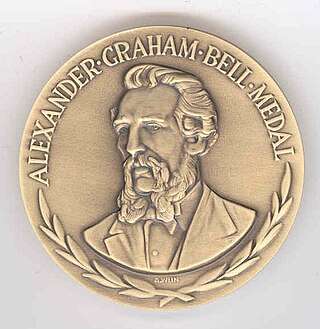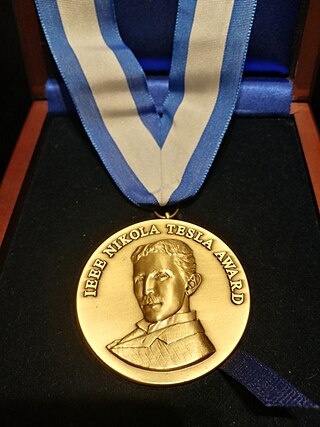The Louisa Gross Horwitz Prize for Biology or Biochemistry is an annual prize awarded by Columbia University to a researcher or group of researchers who have made an outstanding contribution in basic research in the fields of biology or biochemistry.
The J. J. Ebers Award was established in 1971 to foster progress in electron devices. It commemorates Jewell James Ebers, whose contributions, particularly to transistors, shaped the understanding and technology of electron devices. It is presented annually to one or more individuals who have made either a single or a series of contributions of recognized scientific, economic, or social significance in the broad field of electron devices. The recipient is awarded a certificate and check for $5,000, presented at the International Electron Devices Meeting.

Anna Marina Terrana was the elected Member of Parliament (MP) for the constituency of Vancouver East in British Columbia, Canada, serving as that riding's MP from 1993 to 1997 in the Canadian House of Commons - 35th Parliament. Terrana sat as a member of the Liberal Party of Canada.
IEEE W.R.G. Baker Award provided by the Institute of Radio Engineers (IRE), was created in 1956 from a donation from Walter R. G. Baker (1892–1960) to the IRE. The award continued to be awarded by the board of directors of the Institute of Electrical and Electronics Engineers (IEEE), after the IRE organization merged into the IEEE in 1963. Recipients received a certificate and honorarium "for the most outstanding paper reporting original work" in one of the IEEE publications, including the transactions, journals, proceedings, and magazines of the IEEE Societies. The award was discontinued in 2016.

The IEEE Alexander Graham Bell Medal is an award honoring "exceptional contributions to communications and networking sciences and engineering" in the field of telecommunications. The medal is one of the highest honors awarded by the Institute of Electrical and Electronics Engineers (IEEE) for achievements in telecommunication sciences and engineering.
The IEEE Charles Proteus Steinmetz Award is a technical field award given to an individual by the Institute of Electrical and Electronics Engineers (IEEE), for major contributions to standardization within the field of electrical and electronics engineering. This IEEE-level award, which honors Charles Proteus Steinmetz, was created in 1979 by the board of directors of the IEEE and sponsored by the IEEE Standards Association.

The IEEE Nikola Tesla Award is a Technical Field Award given annually to an individual or team that has made an outstanding contribution to the generation or utilization of electric power. It is awarded by the Board of Directors of the IEEE. The award is named in honor of Nikola Tesla. This award may be presented to an individual or a team.
The initially called Morris Liebmann Memorial Prize provided by the Institute of Radio Engineers (IRE), the IEEE Morris N. Liebmann Memorial Award was created in 1919 in honor of Colonel Morris N. Liebmann. It was initially given to awardees who had "made public during the recent past an important contribution to radio communications". The award continued to be awarded as the IEEE Morris N. Liebmann Memorial Award by the board of directors of the Institute of Electrical and Electronics Engineers (IEEE) after the IRE organization merged into the IEEE in 1963. The scope was changed to "for important contributions to emerging technologies recognized within recent years". After 2000, the award was superseded by the IEEE Daniel E. Noble Award.
The IEEE Emanuel R. Piore Award was a Technical Field Award given each year by the IEEE to an individual or team of two people who have made outstanding contributions to information processing systems in relation to computer science. The award was discontinued in 2012.
Joseph Wilfred Goodman is an American electrical engineer and physicist.
The IEEE Founders Medal is an award presented for outstanding contributions in the leadership, planning, and administration of affairs of great value to the electrical and electronics engineering profession. It may be presented to an individual or team of up to three in number. This medal was established by the Institute of Radio Engineers (IRE) in 1952. The medal continued to be awarded after the merge of the IRE with the American Institute of Electrical Engineers (AIEE) in 1963 to form the IEEE. Recipients of this medal receive a gold medal, bronze replica, certificate, and cash honorarium.
The IEEE Cledo Brunetti Award is an award is presented for outstanding contributions to nanotechnology and miniaturization in the electronics arts. It may be presented to an individual or a team of up to three. The award was established in 1975 by the IEEE Board of Directors.
The IEEE Control Systems Award is a technical field award given to an individual by the Institute of Electrical and Electronics Engineers (IEEE) "for outstanding contributions to control systems engineering, science or technology". It is an IEEE-level award, created in 1980 by the board of directors of the IEEE, but sponsored by the IEEE Control Systems Society.
The IEEE Herman Halperin Electric Transmission and Distribution Award is a Technical Field Award of the IEEE that is presented for outstanding contributions to electric transmission and distribution. The award may be presented annually to an individual or a team of up to three people. It was instituted by the IEEE Board of Directors in 1986.
The IEEE Frederik Philips Award is a Technical Field Award that was established by the IEEE in 1971. The award is presented for outstanding accomplishments in the management of research and development resulting in effective innovation in the electrical and electronics industry. This award may be presented to an individual or team of up to three people. Recipients of this award receive a bronze medal, certificate, and honorarium.
The IEEE Haraden Pratt Award was established by the IEEE Board of Directors in 1971 in honor of Haraden Pratt. This award is presented to recognize individuals who have rendered outstanding volunteer service to the IEEE.
The IEEE Richard M. Emberson Award was established by the IEEE Board of Directors in 1986. It is presented to an IEEE member for distinguished service to the development, viability, advancement, and pursuit of the technical objectives of the IEEE.
The IEEE Donald G. Fink Prize Paper Award was established in 1979 by the board of directors of the Institute of Electrical and Electronics Engineers (IEEE) in honor of Donald G. Fink. He was a past president of the Institute of Radio Engineers (IRE), and the first general manager and executive director of the IEEE. Recipients of this award received a certificate and an honorarium. The award was presented annually since 1981 and discontinued in 2016.
The American Association of Immunologists (AAI) is an international scientific society dedicated to furthering the study of immunology. AAI provides its members with a variety of platforms in which to exchange ideas and present the latest immunological research, including the AAI annual meeting and The Journal of Immunology. In 2017, AAI launched an open-access journal, ImmunoHorizons. AAI is a founding member society of the Federation of American Societies for Experimental Biology (FASEB).


